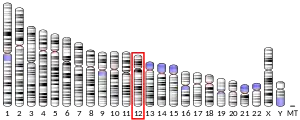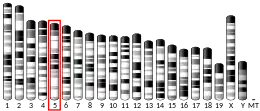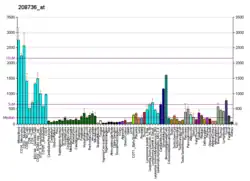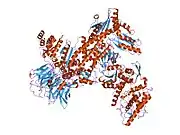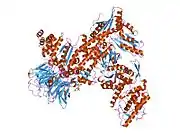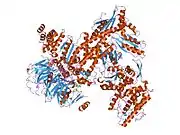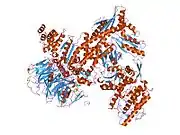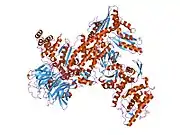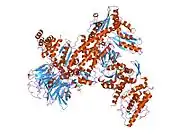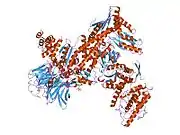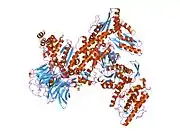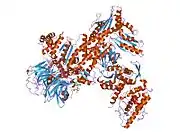ARPC3
Actin-related protein 2/3 complex subunit 3 is a protein that in humans is encoded by the ARPC3 gene.[5][6][7]
| ARPC3 | |||||||||||||||||||||||||||||||||||||||||||||||||||
|---|---|---|---|---|---|---|---|---|---|---|---|---|---|---|---|---|---|---|---|---|---|---|---|---|---|---|---|---|---|---|---|---|---|---|---|---|---|---|---|---|---|---|---|---|---|---|---|---|---|---|---|
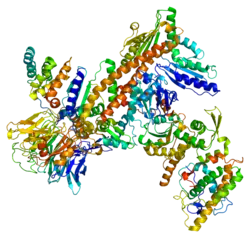 | |||||||||||||||||||||||||||||||||||||||||||||||||||
| |||||||||||||||||||||||||||||||||||||||||||||||||||
| Identifiers | |||||||||||||||||||||||||||||||||||||||||||||||||||
| Aliases | ARPC3, ARC21, p21-Arc, actin related protein 2/3 complex subunit 3 | ||||||||||||||||||||||||||||||||||||||||||||||||||
| External IDs | OMIM: 604225 MGI: 1928375 HomoloGene: 4178 GeneCards: ARPC3 | ||||||||||||||||||||||||||||||||||||||||||||||||||
| |||||||||||||||||||||||||||||||||||||||||||||||||||
| |||||||||||||||||||||||||||||||||||||||||||||||||||
| |||||||||||||||||||||||||||||||||||||||||||||||||||
| |||||||||||||||||||||||||||||||||||||||||||||||||||
| |||||||||||||||||||||||||||||||||||||||||||||||||||
| Wikidata | |||||||||||||||||||||||||||||||||||||||||||||||||||
| |||||||||||||||||||||||||||||||||||||||||||||||||||
| ARP2/3 complex ARPC3 (21 kDa) subunit | |||||||||
|---|---|---|---|---|---|---|---|---|---|
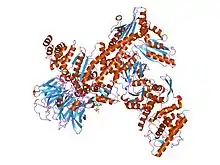 crystal structure of arp2/3 complex with bound adp and calcium | |||||||||
| Identifiers | |||||||||
| Symbol | P21-Arc | ||||||||
| Pfam | PF04062 | ||||||||
| InterPro | IPR007204 | ||||||||
| |||||||||
This gene encodes one of seven subunits of the Arp2/3 protein complex. The Arp2/3 protein complex has been implicated in the control of actin polymerization in cells and has been conserved through evolution. The exact role of the protein encoded by this gene, the p21 subunit, has yet to be determined.[7]
References
- GRCh38: Ensembl release 89: ENSG00000111229 - Ensembl, May 2017
- GRCm38: Ensembl release 89: ENSMUSG00000029465 - Ensembl, May 2017
- "Human PubMed Reference:". National Center for Biotechnology Information, U.S. National Library of Medicine.
- "Mouse PubMed Reference:". National Center for Biotechnology Information, U.S. National Library of Medicine.
- Welch MD, DePace AH, Verma S, Iwamatsu A, Mitchison TJ (Aug 1997). "The human Arp2/3 complex is composed of evolutionarily conserved subunits and is localized to cellular regions of dynamic actin filament assembly". J Cell Biol. 138 (2): 375–84. doi:10.1083/jcb.138.2.375. PMC 2138188. PMID 9230079.
- Machesky LM, Reeves E, Wientjes F, Mattheyse FJ, Grogan A, Totty NF, Burlingame AL, Hsuan JJ, Segal AW (Jan 1998). "Mammalian actin-related protein 2/3 complex localizes to regions of lamellipodial protrusion and is composed of evolutionarily conserved proteins". Biochem J. 328 (1): 105–12. doi:10.1042/bj3280105. PMC 1218893. PMID 9359840.
- "Entrez Gene: ARPC3 actin related protein 2/3 complex, subunit 3, 21kDa".
Further reading
- Welch MD, Iwamatsu A, Mitchison TJ (1997). "Actin polymerization is induced by Arp2/3 protein complex at the surface of Listeria monocytogenes". Nature. 385 (6613): 265–9. Bibcode:1997Natur.385..265W. doi:10.1038/385265a0. PMID 9000076. S2CID 4358529.
- Marchand JB, Kaiser DA, Pollard TD, Higgs HN (2001). "Interaction of WASP/Scar proteins with actin and vertebrate Arp2/3 complex". Nat. Cell Biol. 3 (1): 76–82. doi:10.1038/35050590. PMID 11146629. S2CID 30437883.
- Zhao X, Yang Z, Qian M, Zhu X (2001). "Interactions among subunits of human Arp2/3 complex: p20-Arc as the hub". Biochem. Biophys. Res. Commun. 280 (2): 513–7. doi:10.1006/bbrc.2000.4151. PMID 11162547.
- Robinson RC, Turbedsky K, Kaiser DA, et al. (2001). "Crystal structure of Arp2/3 complex". Science. 294 (5547): 1679–84. Bibcode:2001Sci...294.1679R. doi:10.1126/science.1066333. PMID 11721045. S2CID 18088124.
- Gournier H, Goley ED, Niederstrasser H, et al. (2002). "Reconstitution of human Arp2/3 complex reveals critical roles of individual subunits in complex structure and activity". Mol. Cell. 8 (5): 1041–52. doi:10.1016/S1097-2765(01)00393-8. PMID 11741539.
- Andersen JS, Lyon CE, Fox AH, et al. (2002). "Directed proteomic analysis of the human nucleolus". Curr. Biol. 12 (1): 1–11. doi:10.1016/S0960-9822(01)00650-9. PMID 11790298. S2CID 14132033.
- Strausberg RL, Feingold EA, Grouse LH, et al. (2003). "Generation and initial analysis of more than 15,000 full-length human and mouse cDNA sequences". Proc. Natl. Acad. Sci. U.S.A. 99 (26): 16899–903. Bibcode:2002PNAS...9916899M. doi:10.1073/pnas.242603899. PMC 139241. PMID 12477932.
- Gevaert K, Goethals M, Martens L, et al. (2004). "Exploring proteomes and analyzing protein processing by mass spectrometric identification of sorted N-terminal peptides". Nat. Biotechnol. 21 (5): 566–9. doi:10.1038/nbt810. PMID 12665801. S2CID 23783563.
- Gerhard DS, Wagner L, Feingold EA, et al. (2004). "The status, quality, and expansion of the NIH full-length cDNA project: the Mammalian Gene Collection (MGC)". Genome Res. 14 (10B): 2121–7. doi:10.1101/gr.2596504. PMC 528928. PMID 15489334.
- Andersen JS, Lam YW, Leung AK, et al. (2005). "Nucleolar proteome dynamics". Nature. 433 (7021): 77–83. Bibcode:2005Natur.433...77A. doi:10.1038/nature03207. PMID 15635413. S2CID 4344740.
- Dubois T, Paléotti O, Mironov AA, et al. (2005). "Golgi-localized GAP for Cdc42 functions downstream of ARF1 to control Arp2/3 complex and F-actin dynamics". Nat. Cell Biol. 7 (4): 353–64. doi:10.1038/ncb1244. PMID 15793564. S2CID 37000096.
- Stelzl U, Worm U, Lalowski M, et al. (2005). "A human protein-protein interaction network: a resource for annotating the proteome". Cell. 122 (6): 957–68. doi:10.1016/j.cell.2005.08.029. hdl:11858/00-001M-0000-0010-8592-0. PMID 16169070. S2CID 8235923.
- Ewing RM, Chu P, Elisma F, et al. (2007). "Large-scale mapping of human protein-protein interactions by mass spectrometry". Mol. Syst. Biol. 3 (1): 89. doi:10.1038/msb4100134. PMC 1847948. PMID 17353931.
External links
- ARPC3 human gene location in the UCSC Genome Browser.
- ARPC3 human gene details in the UCSC Genome Browser.
This article is issued from Wikipedia. The text is licensed under Creative Commons - Attribution - Sharealike. Additional terms may apply for the media files.
